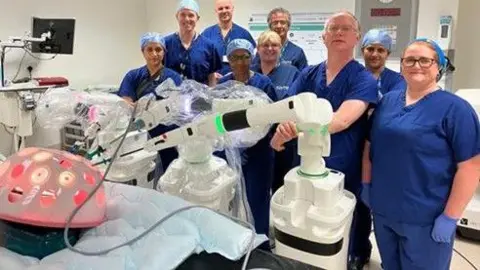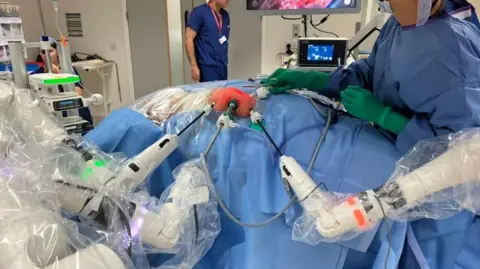Parents 'amazed' as surgical robots treat baby boy
 MFT
MFTParents of a four-month-old baby boy who was the youngest in the world to have robot-assisted surgery have said they were "amazed" at the result after fearing treatment was not possible.
Mohammed went under the knife at Royal Manchester Children's Hospital for a kidney issue as part of a clinical trial using surgical robots designed to mimic human joints.
His mother Mariam said she was concerned he would be too small for surgery, but the "revolutionary care" had made a successful operation possible.
David Keene, a consultant surgeon at the hospital, said medics were excited by he "level of precision" the robot technology had brought.
 MFT
MFTMohammed was treated under a trial of the use of the Versius Surgical System in paediatric surgery.
The technology by British Medical firm CMR Surgical consists of small, portable surgical robots with modular arms that can be controlled by surgeons.
It allows for more precise movements and for faster recovery time by making operations less invasive.
'Huge relief'
In baby Mohammed's case, he underwent surgery on a tube that connects his bladder to his kidneys, which were at risk of severe infection.
"We didn't think it would be possible for him to have the surgery needed to fix the problem at just four months old," Mariam said.
She said: "It was a huge relief when we found out that he wouldn't have to wait because doctors can operate so precisely using the robotic system.
"Mohammed was back home just three days after the surgery and he's doing great."
The technology has allowed surgeons at the hospital, which is part of part of Manchester University NHS Foundation Trust, to do two operations a day, where previously only one surgery would be carried out.
Mr Keene said this new generation of surgical robots was "particularly suited" to reconstructive surgeries involving children.
About 25 robotic urology operations have been carried out at the hospital since August 2024 as part of the study.
Listen to the best of BBC Radio Manchester on Sounds and follow BBC Manchester on Facebook, X, and Instagram and watch BBC North West Tonight on BBC iPlayer
